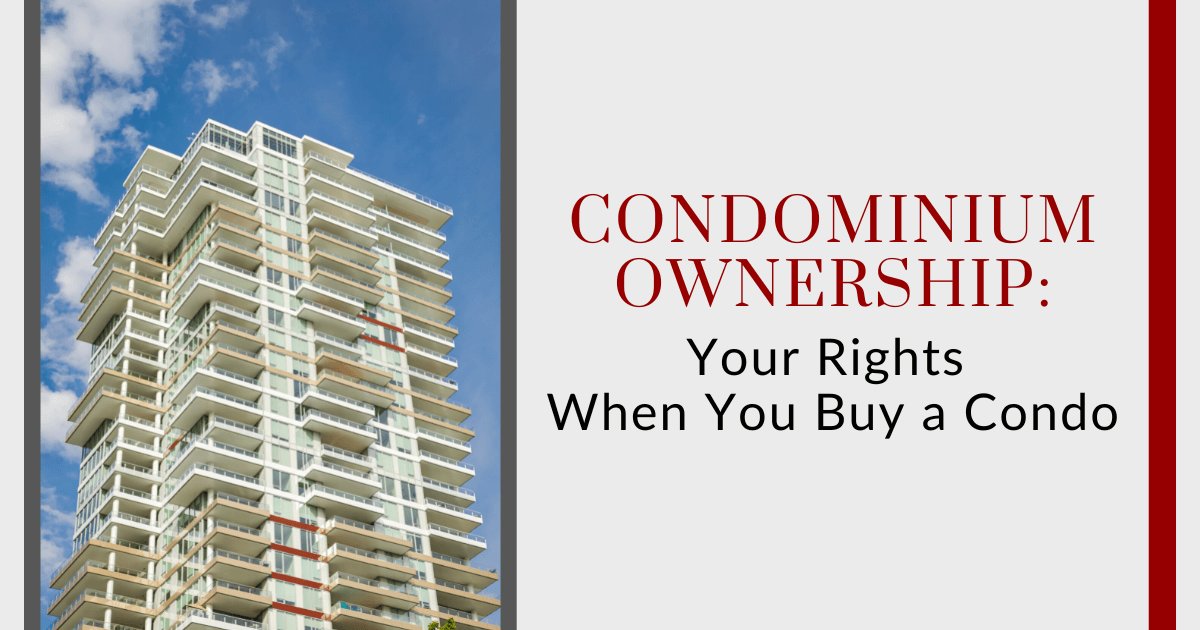Condominium Ownership: Your Rights When You Buy a Condo
Posted by Dave Kotler on Wednesday, September 7th, 2022 at 2:19pm.

Buying a condo can be an opportunity to make passive income, or it could be a remarkable place to call home. Owners and tenants enjoy the perks of condo communities, which typically include fewer maintenance responsibilities and amenities like pools and fitness centres. Whether the buyer intends to live there or rent it out, knowing what they're going to own after signing a purchase contract for a condo is a must. Ownership rights ultimately impact what the owner is responsible for and what the Community Association is liable for concerning upkeep, repairs, and access.
Apartment vs. Condo: What's the Difference?
While condos and apartments typically have a similar layout and common community amenities, both are multi-unit properties that can be present in low-rise, high-rise, and medium-rise designs. However, some key differences exist—especially regarding ownership, rental rights, and responsibilities concerning apartments and condos.
Condos are individually owned, and units can be rented out to tenants. The owner is also likely to be the landlord and will be responsible for maintaining major interior systems in the specific condo. However, a community association oversees most exterior upkeep of the condos, shared amenities, and other services. Condo owners will be required to cover association fees.
Unlike condos, apartments owned by a corporation are strictly for rent and are secured by tenants through a property management company. A superintendent maintains the exterior and interiors of apartments, and tenants don't pay for landscaping or repairs for provided appliances or systems.
Who Owns the Common Areas in a Condominium?
There are several levels of ownership in a condo community. In addition to the home, buyers will ultimately own an "interest" in the common areas overseen by the community association. Areas that aren't technically a part of the unit are often considered common, limited, or exclusive common elements.
Common and limited common elements are parts of the condo community that are typically assigned to individual units but are considered community property. In most cases, these areas are available for use by all condo owners and tenants. These elements might include:
- Parking areas
- Pools and spas
- Fitness centres
- Clubhouses
- Elevators
- Green spaces
Exclusive-use common elements include common elements designated for the exclusive use of a specified unit or units. These typically include patios, balconies, parking spots, loading docks, and storage areas. While specified occupants use them, these spaces are technically owned by the community association and maintained by the dues of others with an "interest" in the property.
Do I Own the Land Under My Condo?
Those buying a regular condo will typically own the unit's interior features, including the property's exterior, the communal spaces, and the land the condo is built on. These aspects of the property are managed and owned by the condo association.
Owning a freehold condo is different from owning a traditional one, as owners also buy the plot of land the unit is built on. This gives the owner and tenants more freedom regarding the property's exterior. Freehold condos tend to cost more, but they offer advantages that may make the investment worthwhile for some buyers.
However, those buying a freehold condo will be responsible for any repairs and maintenance of their property instead of relying on the condo association. This could result in owners paying for landscaping upkeep, exterior painting, and roofing repairs.
How Do I Learn About Condo Ownership Rights?
The Condominium Authority of Ontario (CAO) is a top resource for condo owners, tenants, and directors. They offer information concerning the rights and responsibilities of all parties involved in condo ownership and oversight, including explanations of by-laws, declarations, and rules of the Condominium Act of 1998.
In addition to the set declarations within the Condo Act, the declaration, by-laws, and rules are the primary sources of condo governance. Collectively, they are called "governing documents" and are instrumental in determining how the condominium corporation must manage its affairs and conduct business.
The governing documents reveal essential information concerning the powers and responsibilities of the condo association, the owner's rights and obligations, what is permitted in the condo corporation, and any restrictions. Each governing document has a specific purpose.
The community declarations are just one document that a condo corporation must submit when registering with the Land Registry Office. The declaration predominantly puts forth the constitution of the condo association and contains many of the most important provisions.
The by-laws lay out several key aspects of how the condo corporation should govern itself. These details will include the number of directors on the board, board procedures, meeting procedures, and how the affairs of the condo association are generally conducted. Essentially, they are considered the administrative guide for the condo corporation.
The condo rules are regulations promoting the safety of each owner and their tenants to prevent unreasonable interference with the use of the units and common elements. They dictate what individuals and the association can and cannot do on the property.
Know What You're Buying When Investing in a Condo
Buying a condo can be an excellent investment for first-time home buyers, those looking to downsize, or buyers who want to enjoy minimal maintenance and popular amenities. However, before signing a contract, know what you'll own and be held accountable for and what the community association owns and takes care of. Carefully read the condo community's governing documents to understand these policies when shopping for a new home.
Dave Kotler

